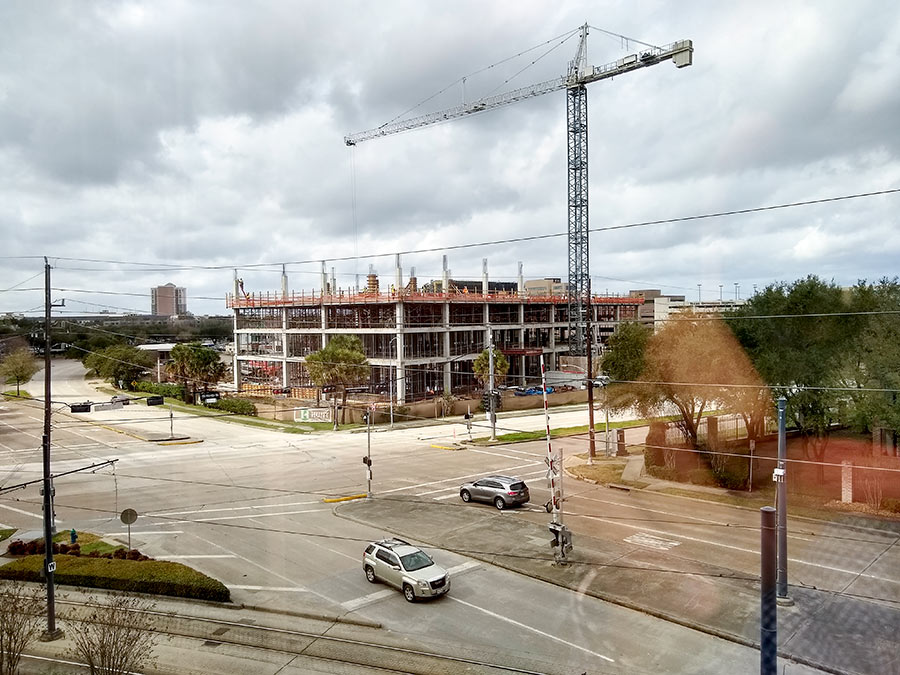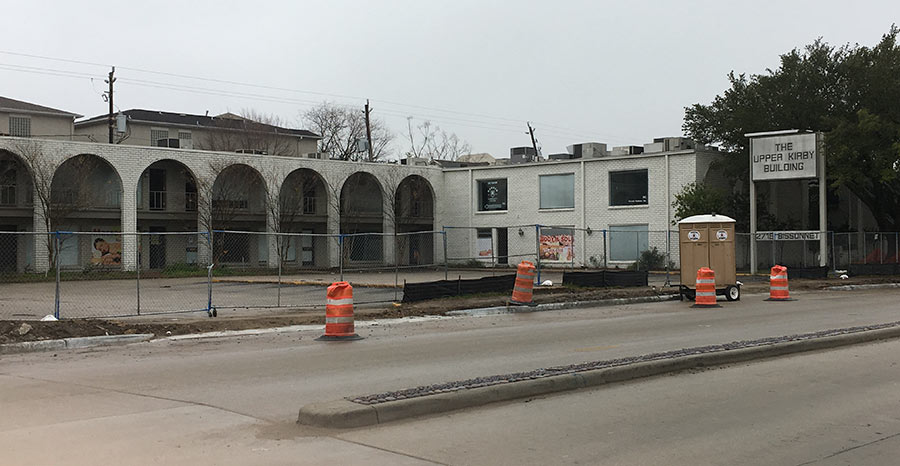OIL PRICE PLUNGE LEADS TO STOCK DOWNGRADE FOR NEW GREENWAY PLAZA OWNERS  Last year Atlanta-based Cousins Properties splashed out big in the Houston office market, purchasing all 4.4 million sq.-ft. of Greenway Plaza for $950m in October, 8 months after they snapped up the $233m Post Oak Central complex, making Houston the dominant market in the CUZ portfolio. Which might have seemed a great idea in October 2013, when crude was going for about $100 a barrel, but now? A security analyst from Bank of America and Stifel have both downgraded Cousins Properties shares from “buy” to “hold,” citing falling oil prices and the company’s exposure to Houston. [Realty News Report] Photo of lightning over Greenway Plaza: Russell Hancock via Swamplot Flickr Pool
Last year Atlanta-based Cousins Properties splashed out big in the Houston office market, purchasing all 4.4 million sq.-ft. of Greenway Plaza for $950m in October, 8 months after they snapped up the $233m Post Oak Central complex, making Houston the dominant market in the CUZ portfolio. Which might have seemed a great idea in October 2013, when crude was going for about $100 a barrel, but now? A security analyst from Bank of America and Stifel have both downgraded Cousins Properties shares from “buy” to “hold,” citing falling oil prices and the company’s exposure to Houston. [Realty News Report] Photo of lightning over Greenway Plaza: Russell Hancock via Swamplot Flickr Pool





I call this previews of coming attractions. Many of us have been here before…Houston can be counter cyclical to the rest of the country. We have enjoyed years of expansion. There is a lag factor, but we should brace ourselves for a contraction. If your crane is just coming out of the ground, you are too late for this party. Let the hangovers begin.
I told you so.
As someone who is not planning on selling my inner-loop property anytime soon, I would be okay with Houston real estate dipping a bit for my property taxes to go down in the short-term. Long-term fundamentals of our fine city are still good — so I’m not worried over the next decades…
I don’t think home property values will go down (at least in the desirable inner loop and western areas) but the climb will likely grind to a halt. Also, new construction will either slow, or the ridiculous asking prices for some of the new construction will go lower. It’s unbelievable what some new construction asking prices are in areas like the Third Ward, EADO/east end, etc.
The key will be how long oil prices stay low. If they pop back up by the end of 2016, the boom will resume after a momentary pause. If they go down and flatline like they did in the 80’s, things will start looking like the 80s.
It is possible for a run up in real estate prices to be sustainable. Just look at New York City prices from the 1970s to now. With a few blips, it’s been a steep and steady rise. Of course, Vegas style booms with a hard bust are possible as well. Too early to tell which way Houston will run.
I told you so.
________________
what a jerk off
you can’t simply compare rises in property values without looking at the fundamentals though. NYCs is a global city with much more complex fundamentals in which even the banking crisis barely dented. Houston’s run was almost entirely based on an unprecedented constriction in supply, which has in turn been met with record levels in building activity. that’s a huge benefit for Houston and the other sunbelt cities that can continue to grow and absorb new residents in a matter of years as opposed to places like NYC.
***
tax values will hold and probably still climb some (at least i hope), but asking prices will go back down and we’ll just find ourselves back in 2006 with gentrification slowly branching out from the central parts of town and most all of our growth occurring in the distant suburbs. i certainly don’t see the sky falling out or anything close here over the price of oil, but i’m still holding all my doomsday cards for 15/20yrs time when we have the boomers trying to sell off all their homes to folks that have been experiencing wage erosion ever since the late 70’s.
The 80’s didn’t only result in a loss in real estate values, it also resulted in a population drop as people left in droves to find work. Unfortunately, Houston hasn’t been a city where people move to so they can stay. They move here for a job, and if the job disappears, they are likely to disappear with it. When we are in the money in Houston, we don’t spend enough on quality of life issues to help us be a self-sustaining city, or to attract industries beyond O&G. It is a lesson that is never learned, and I have been here since the 80’s.
Houston: the wonder city that showed the country how laissez-faire economics, conservative values, and lax planning lead to growth and prosperity.
It turns out Houston was just benefiting from another bubble and a siphoning of wealth from the rest of the country via higher gasoline prices.
The shale boom was supposedly proof that peak oil was dead and we can keep building car-dependent cities. Houston was riding into the future in its new Mercedes.
It turns out that shale was only accessible at prices too high to pay to maintain strong economies around the world. When consumers cut oil demand, the shale, deepwater, and tar sands dry up.
We’re on the slope downward, folks. Oil prices will likely spike again when demand returns, Houston may boom temporarily, but consumers aren’t going to be able to pay for it forever. After the spike, demand slackens, prices drop, and expensive new oil projects are cancelled. Production drops, demand outstrips supply, and we hit another price spike. Over and over it goes until we one day wonder why we can’t afford to open the oil taps as wide as we could in the 2000-2010s. The thriving economies will be the ones that depend least on oil.
In the same day the the Houston office building sales price record was broken by 1000 Main hit the news. Gotta think those guys just puckered up.
The real estate holding I’d be worried about is all the new “luxury apartments” that are under construction right now inside the western loop and Galleria areas. They are being built expecting a long stream of newcomers moving to Houston to collect handsome paychecks in O&G. A year from now there may not be moving here in such numbers. Who’s going to be renting all those new apartments at $1600 for a 1 bedroom then?
The Houston metro population is over 6MM, over twice as much as the 80’s. It is an extremely large and complex economy. E&P companies will take a huge hit if WTI remains at or below break evens (already Conoco and BP are cutting some budgets and jobs), but mid and downstream margins remain strong, the healthcare industry remains strong (among others), so in my humble opinion the millions of Houstonians who work and live here will largely go unaffected. We may see stabilization of property values and some neighborhoods may decline but overall I think the Houston economy will continue to steadily grow.
Many who look at the Houston overall economy overestimate the sensitivity of oil prices. The economy is more diverse than many are willing to admit, and some industries that most think of as part of the “oil business” – chemicals, refining, etc. – can actually experience positive effects from lower crude oil prices. The midsized to small producers who are highly leveraged will experience the greatest damage from a long run of low oil prices, which is not an insubstantial market niche, but most of what is left should be just fine, thank you.
I’m with Shady Heightster about the fate of new luxury apartments. There was an article recently in the Chron in which an analyst with the Greater Houston Partnership said there will be 24,000 new apartment units coming online in the next year, but the demand will probably only be for 19,000 units. And that was before the price of oil started dropping. I’m guessing some, if not all, of the projects that haven’t broken ground yet will not get built anytime soon. (I’d post the link, but Chron.com has a terrible search engine.)
The only reason Gulf downstream operations were profitable was due to the price discrepancy between WTI and Brent and the ability to export refined products overseas. For refineries on the East and West Coasts, the story was much different where feedstock prices more closely matched world prices and where demand was falling due to higher overall prices. Some East Coast refiners faced shutdowns. If the shale boom is knocked out by a long-term dip in oil prices, the WTI/Brent spread could disappear and leave refiners losing their profit margins.
I suspect everyone on this board, die-hard booster or pessimist, has had at least a hint of an uneasy feeling regarding the unbridled construction around town over the last year or two. It is feeling more fragile.
Thats a fitting picture.
I’m in healthcare and know nothing about oil and gas. Can someone explain why companies don’t plan for something like this? I’m confused as to why the sky is falling when it would seem any legit business would plan ahead for these scenarios. Is oil just a big party of ruff necks and no one plans for the future?
It wasn’t solely the collapse in oil prices in the 1980s that led to Houston’s demise; after the collapse in oil we were hit by the Tax Reform Act of 1986 that changed passive activity loss rules that governed real estate investments, further collapsing the values of properties that had been bulit as tax write-offs which led to the collapse of the S&L as a lending vehicle because they had made some very risky bets to offset the high rates of interest they had to pay depositors because of runaway inflation in the 1970s.
I don’t see anything like that in our future; sub-$70 oil for an extended period is probably not very good, but I don’t believe this is a long-term price shift. The OPEC countries won’t be able to sustain the loss of revenue because oil subsidizes their governments. All of them (save 2) including the country your thinking off need $75-$80/BBL oil. They may try and squeeze tight oil plays, but most of the Eagle Ford is profitable at $50/BBL or below.
I’m not a stock analyst so I don’t know about the merits of a downgrade, but I would think Greenway Plaza has limited exposure to energy as it’s mainly a financial and legal center. There are certainly marginal developments that may struggle in the short term, but my money’s still on Houston. Where else are you going to put it?
The reckoning begins!
@Brian
Fluctuating commodity prices are certainly planned for. The plan is to stop future projects whose required commodity price to profit are too high and lay off staff/reduce bonuses/encourage early retirements. When commodity prices are rising, you hire staff and give big bonuses to keep staff happy, and seek out all kinds of projects. The biggest companies have better plans and less (proportional) debt, so are better situated to wait out lower prices.
The big companies will remain, some of the smaller companies will fail/merge/sell out.
@ diggity: If I sound a bit smug to say “I told you so,” it’s because several months ago people on here were telling me that it was “irresponsible” to have bearish short-term prognostications for Houston.
To all others concerned, the best forecast of commodity prices tomorrow are commodity prices today. This is reflected in the foward price curve of oil futures on the New York Mercantile Exchange. We got where we are because global demand growth was eroding and OPEC’s core nations decided to let the supply of oil float according to market demand. OPEC is likely to begin squeezing supply slightly by mid-2015, but there is a significant possibility of outright global recession between now and then. Recession is not the consensus, but if it occurs (and it WILL OCCUR later if not sooner) then many analysts believe that oil could go as low as $40/bbl. I tend to think that a recession would prompt OPEC to react by constricting supply more quickly, so I don’t think that $40/bbl is realistic; but I do think that there is significant downside risk over the next year or so.
For Houston, I think that that mostly would mean that there would be a flurry of reorganizations, mergers and acquisitions, and renegotiated contracts. It would be a very painful period. The labor market would become very loose. Wages would decline, bonuses would cease. Longer-term prospects for demand growth are not as strong as they had been in past decades; demography is catching up to the developing world, especially China. Oil prices will climb again after a few years at most, but they may not reach their previous highs for decades to come.
Refining should be a bright spot and the big capex that is already under way ($18 billion in SE Texas) is going to continue at least until those projects have wrapped up. But that’s not a very labor-intensive industry if it isn’t growing and global demand concerns could be problematic in the short run, amplified by a strong dollar. These concerns are largely offset by the prospect that energy demand will increase as a result of low energy prices. Refining is the silver lining on this cloud, but let’s not be mistaken about anything — this IS a rain cloud and its lining is peripherally important.
The folks that have been saying that Houston has diversified simply aren’t parsing the data well enough. If you think that the legal, accounting, and other business services sectors in Houston do not have a grave exposure to the energy industry, you’re smokin’ crack. (No disrespect, oh I would never be disrespectful…no, no.)
regardless of how diversified Houston is, I think it’s equally important to look at where all our growth has come from since the last recession. i’ve seen estimates that Houston’s economy was about 80% oil & gas in the 80’s as opposed to about 50% today. pure speculation on my part, but it appears that nearly all of Houston’s growth over that past 5 years has been purely oil & gas driven with job expansion and relocations fueling the construction and retail industries which are entirely dependent on these higher wage industries. the oil & gas expansion was able to offset the big losses we’ve had in the aerospace industry as well. i really doubt that population growth and demographic changes alone can account for much of any growth these days with such low wages in these industries.
For those doom and gloomers out there. I will help you out. Let me know what assets you have in Houston and I can take them off your hands now so you dont have to lose money on them when your predicted crash hits.
@ joel: I’ve seen the same data as you have. It was released by Dr. Barton Smith when he was leading up UH’s Institute for Regional Forecasting about ten years ago (and has been heralded rather obnoxiously by the Greater Houston Partnership ever since), but I’ve always regarded it as one of his more dubious claims. The employment data that he had to work with simply wasn’t detailed enough to reliably draw the conclusions that he was attempting to get at, and too many of the categories of firms that he would exclude from the tally have significant portions of their business that overlap the energy sector either directly or indirectly. For instance, a manufacturing firm that does metal machining may or may not be classified for statistical purposes as doing strictly energy-related work, even if that’s 99% of their business, and it wouldn’t be counted in the stats. The same could be said for a firm like BMC Software, which has a huge base of energy clients.
Other people misunderstand the stat to begin with. He was trying to measure core (or primary) employment that was energy-related, so he excluded non-core (or secondary or indirect) employment at firms such as restaurants or hospitals or schools or in local government. All of those classes of work exist in Houston only because the core employment exists. Needless to say, there are some gray areas in trying to identify those as well.
Brian – because it turns out greed is bad.
Good, we can start rolling out the red carpet for international buyers – in other words, people who have a wide variety of other options. Construction and design quality should improve significantly depending on the severity of the downturn. Let’s hope streetscape quality, landscape and park improvements are in order as well.
.
Sure the future appears scarily uncertain, but maybe the best opportunities will be actualized by doubling down, effectively in preparation for the next uptick and boom.